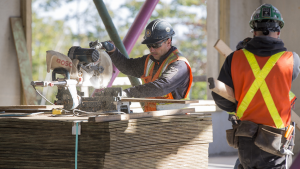An agreement by the Council of Atlantic Premiers to streamline and harmonize training, certification and licensing for skilled tradespeople across the four provinces should improve labour mobility and safety at a time when cross border work is on the rise.
Duncan Williams, president of the Construction Association of Nova Scotia (CANS), sees the agreement reached by the premiers July 1 as a starting point to removing bureaucratic red tape that hampers the growing numbers of contractors working in multiple provinces in the region.
“It sends the right signal. You could turn a blind eye to this when we had lots of bodies in our own provinces but now we have to look at harmonization because we have labour shortages,” says Williams. “These types of things are holding us back as a region.”
Along with aligning training, certification and licensing, the agreement looks to speed up the registration process for skilled tradespeople crossing borders.
One of the keys, Williams says, is to align various certifications and regulations without compromising safety in the workplace.
“We have to look at what we can streamline…where we can enhance efficiencies without compromising quality control, safety training, etc,” he explains.
Fall arrest training is a case in point. Training is one day long in all of the Atlantic provinces’ except Newfoundland and Labrador where workers are required to take two days of training to meet certification.
For out-of-province contractors that extra day may not be an issue on small jobs requiring one or two workers but on projects requiring 10, 20 or more workers that extra day translates to significant lost production time, Williams says.
He suggests a review of safety data in each province will help determine what training period and methods work best.
“Is it safer in Newfoundland because of the two days of training or is it actually making any difference and is really just bureaucratic red tape?”
Williams met recently with the province and the local construction safety association in Nova Scotia.
“If we advocate for change, I want it to be data-driven,” he adds.
The president of CANS adds discussions among his peers in other provinces are necessary to identify where things such as technical safety can be aligned.
“What can we do about removing red tape that adds no value or protections for the public or the workers?”
Adding that for decades the Atlantic region had protectionist measures in place to prevent out-of-province contractors from taking jobs away from locals, he says those measures today often hurt local economies more than they help.
“We’ve got the inverse situation now — too much work and too few people,” he states.
Trades such as carpentry are particularly affected by border walls because carpenters “tend to move around the region quickly for work.”
While Red Seal certification allows journeyperson carpenters to cross provincial borders, Williams says apprentices often run into difficulties registering in another province.
In addition, not all skilled trades have Red Seal certifications, he says.
“There isn’t a silver bullet to solve all of these issues but if we can remove simple things it is a start.”
Roy Silliker, general manager and CEO with the New Brunswick Construction Safety Association (NBCSA), says while he is not familiar with all the details of the premiers agreement, he sees value in its intent.
“Any movement towards making a more standardized, harmonized way of doing business across Atlantic Canada is good for us all.”
Silliker says the NBCSA has worked closely to remove training barriers with its sister associations in Atlantic Canada but one stumbling block is Newfoundland and Labrador’s fall protection and confined space training which are both two days long as mandated by the province.
Various safety associations in the provinces have been in discussions with appropriate government agencies to create a training course that is acceptable across Atlantic Canada, he adds.
Sam Sanderson, general manager of the Construction Association of Prince Edward Island, doesn’t see the agreement having a major impact on contractors in his province.
“There are not many contractors leaving the province for work elsewhere because there is so much work here now,” he adds.







Recent Comments